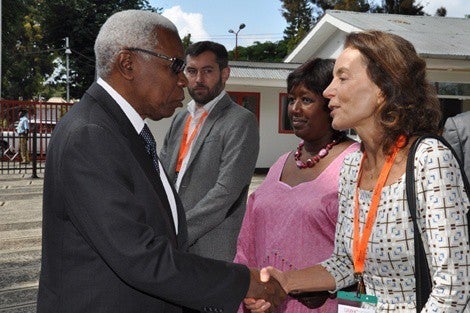March 5, 2013 — Throughout history, more women have died in childbirth than men have died in battle, Mahmoud Fathalla, founder of the Safe Motherhood Initiative, told attendees at the recent Global Maternal Health Conference in Arusha, Tanzania, co-sponsored by Harvard School of Public Health’s Maternal Health Task Force (MHTF) and Management and Development for Health (MDH), a Tanzanian non-profit. Fathalla and other speakers urged the more than 750 audience members, who represented 59 countries and work in more than 110 countries, to continue working for the health of the 200 million women who become pregnant each year.
Conference attendees collaborated on a maternal health manifesto that was published in The Lancet on February 22, 2013. [[Ana Langer]], director of the MHTF and professor of the practice of public health at HSPH, Lancet Editor Richard Horton, and Guerino Chalamilla, executive director of MDH, co-authored the piece, which incorporated ideas raised during the conference and feedback from the participants. The authors hope to keep maternal and women’s health part of discussions during the High-level Dialogue on Health in the Post-2015 Development Agenda, held March 5-6, 2013 in Gaborone, Botswana. Representatives from the World Health Organization and United Nations will meet with government officials and experts from around the world to develop suggestions for the development framework that will follow the Millennium Development Goals (MDGs).
Launched by the United Nations in 2000, the MDGs include two women’s health goals to be achieved by 2015: A 75% reduction in maternal mortality (from 1990 levels) and universal access to reproductive and sexual health services. Maternal mortality has been reduced by nearly 50% since 1990, but only 24% of developing countries are currently on track to achieve this goal by 2015. There is still much more work to be done, according to the manifesto authors. With less than a thousand days before the MDGs run their course, they sought to define a framework for maternal and women’s health goals in the next set of targets.
The manifesto, which calls for “a new and challenging goal for maternal mortality reduction” that embraces “political, economic, and social rights for women,” reflects the collaborative spirit of the conference in a concrete way, Langer said. The writers state that as maternal mortality declines, policy makers need to focus on improving the quality of maternal health care while simultaneously ensuring that the care is delivered in a way that respects women’s dignity.
“The manifesto will help make sure that women’s health stays high on the list of priorities that the world needs to keep working on,” Langer said. “It will hopefully also draw more attention to the agenda of the Women and Health Dean’s Flagship Initiative here at HSPH. This is an area where we are well-positioned to move the agenda forward.”
At the conference, presentations focused on quality of maternal health care. How to achieve respectful reproductive health care for all women was a key topic. Speakers told stories of women around the world who are verbally and physically abused during delivery. It is an issue that has not always received a great deal of attention, Langer said, but it is essential. “It doesn’t matter how technically good maternal health care services are. If women are mistreated, they won’t use them,” Langer said.
Keynote speaker Agnes Binagwaho, minister of health from Rwanda, spoke about working to improve maternal health post-genocide when the future was “only a promise.” Other speakers included Tanzanian Vice President Mohamed Gharib Bilal and Tanzanian First Lady “Mama” Salma Kikwete, who spoke about efforts to bring down maternal mortality in their country. Although maternal deaths declined in Tanzania by 21% between 2005 and 2010, rates are still higher than the target set by the MDGs. The government has intensified its efforts to keep mothers healthy, allocating $40 million this year for initiatives including educational campaigns and training for skilled birth attendants.
Langer and other conference organizers sought to make the event, which was held in mid-January, as inclusive as possible. They provided financial assistance for travel expenses to participants from developing countries where maternal mortality is most keenly felt and to young professionals. The full conference was simultaneously translated into French, and plenary sessions were translated into the local language Kiswahili, as well as Spanish.
The MHTF is the flagship project of HSPH’s Women and Health Dean’s Flagship Initiative (W&HI), also led by Langer. Through research, education, and communications projects, W&HI works to advance an agenda focused on women’s health needs and on their roles as participants in the health care system.
“Maternal health will not improve and maternal mortality will not decrease unless we all stand together to fight for improving the quality of maternal health care, which more than 750 of the world’s experts did in Arusha at the Global Maternal Health Conference,” Langer said. “The momentum created will not be ignored.”
